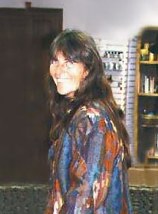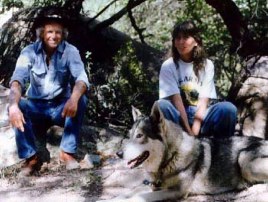| Meet the people behind MetiSupply |
|
"Discovering a positive identity to being of mixed heritage in the U.S. seemed to have always been on my karmic plate. I was born in 1947 in California. My family's many strands were not unique in heading for better places to live. For generations California was looked at as a place to start anew. In my case, it became the start of an idea about both owning and employing all the heritages we are of - in an altogether positive way. Especially after my sister, Lyn, moved to Vancouver, Canada in 1966. Visiting her I realized there existed a society similar to the U.S. but with different baggage and less bragadoccio than ours (the U.S.).
I found real information available when I read Saskatchewan professor Howard Adam's Prison of Grass . It allowed me to realize that part of why Canadian society "felt" differently had to do with an identity about mixed heritage; the Metis; who, in Canada, are people mixed of European and Native/First Nation's families. Their term, Metis, being a French word, was also positive and self-employed. This was a far cry from the imposed negative terms in both English and Spanish for mixed-blooded people throughout the rest of the Americas.
Reading Jack D. Forbes' statistics about the volume of Native inter-mixture in all the Americas further propelled me into realizing we were a 'sleeping giant'.
For there to exist a positive term and actual statistics significantly enriched my beliefs that we were part of an existing motherlode of good ideas. I felt I was guarding a gem.
What happened next was how discovering that an entire sharing of real spiritual wisdom was intact by what Hyemeyohsts Storm wrote in Seven Arrows. That meant there always had been something bigger and wiser than anything offered for me to understand my life with. My personal call to leadership began. American metis had real roles to play in leadership to a world fraught with heretofore dodged and denied questions for the benefit of everyone's survival.
So, I wove the term 'metis' into my collected bibliography - excerpts and fact sheets that I used for five years before I had 'the luck' to meet Heyemeyohsts Storm. When he'd read those sheets, the logic of using this term in the U.S. instantly became clear.
And it spread like wild-fire because of both his well-deserved fame and the immense need for having such a term. That, and NAMA, began in 1978.
The intervening 22 years indicates we are much more aware that some new term must supplant the divisions we are keeping ourselves and others into. Conservative U.S. "think-tank" research reports, through the news media, have run up trial balloons on how to get us out of the log-jam of continuing use of terms for "races" and other kinds of people; rather than continue using terms created in pre-Civil War slave-owning societies. The changes about to transpire, as we witness a dizzying number of categories already printed on the 2000 Census, will make the way the body politic understands this topic very timely, very soon.
My own African, Hebraic and Australian-Irish backgrounds complement my traditionally-defined Metis identity. Frankly, I'm ready to be a world-Metis.
The objective reality for anyone with a sense of the way humans have been interacting (anywhere) is to realize how truly mixed in heritages most of the human family is. To realize what has been carried on under the aegis of "useful descriptions" as to defining 'races' is to reckon with how much of a growing proportion of the general population is a result of so-called "racial intermixing". The conundrum seems to be: that without naming a name for what this makes us - we are always subject to every type of invisibility and illogical pidgeon-holing that serves the worst divisiveness. Government bureau's and policies have made blood quantum an ingenious way to divide up people of Native, or First Nation's heritage.
Schools, taxes, admission policies, hiring quotas and literature itself all suffer from this unworkable pseudo-science of defining races.
Social conditioning that continues 'us' and "them" behavior seals us in the boxes we believe we "belong" in.
Convincing histories detailing the prevalency and the clarity of those who aren't included in such simplistic "categories" will be told by those who have no alternative but to speak up about themselves and their families. The prospect of demolishing the imposition and internalization of these terms creates simultaneously the re-ordering of earth-positive and intelligently sound approaches to solve real needs human beings are facing while resetting the self's appreciation of being human. "

Mary Harper-Bellis
MS, CPC, CSAC
MetiSupply CEO
|

|
Mary Harper-Bellis is the President of the National American Metis
Association (NAMA). Over the past three decades, she has been on the
founding boards of five national organizations and she currently sits on
the Boards of three of them. Although Mary's professional training is
in psychology, education, and rehabilitation, she has a sound background
in business administration which she studied in undergraduate school and
she has had over twenty years experience administrating treatment
programs, clinics, and hospitals. Mary is committed to creating ways
for our Metis people to remain independent through successful small
businesses which are Metis owned and operated.
"I will never be an employee again in my life and I hope our young Metis
People will remember how fiercely our ancestors have struggled to be
independent and free."
~Mary Harper-Bellis, MS, CPC, CSAC
President
National American Metis Association



